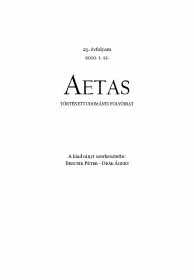Felekezeti viták a katolikusok és a protestánsok érvényesülési lehetőségeiről a Horthy-korszakban
Denominational Debates about the Career Opportunities of Catholics and Protestants in the Horthy Era
Author(s): Zsolt GicziSubject(s): History
Published by: AETAS Könyv- és Lapkiadó Egyesület
Summary/Abstract: The relations of Catholics and Protestants were characterized by a unique duality in the Horthy era. On the one hand, the two religious camps made attempts to maintain denominational peace and cooperation, but on the other, they were often engaged in conflict. One of the main reasons leading to the conflicts between the Catholic and the Reformed camp were the career opportunities of those belonging to a given denomination. In the years between 1919 and 1945, the Catholics and the Protestants mutually accused each other of usurping well paid public offices as well as military, research and other positions. Many leaders of the Catholic group resented that Miklós Horthy, the regent of a predominantly Catholic country, was a Calvinist. Moreover, the prime ministers had also been Protestants for a quite long period. The Catholic camp strove to substantiate with statistical data that the Reformed religion was overrepresented in public offices. To that end the archbishop of Esztergom, Jusztinián Serédi solicited the prime minister Count István Bethlen in 1928 to have an official report compiled about the religious affiliations of leading state officials. The document was finished in 1929 and is currently held in the archives of the Esztergom archbishopric – now we publish it as an appendix to our paper. The report bears witness to the fact that strong Protestant dominance, as insisted by the Catholics, was apparent among ministers, undersecretaries and alispáns at the end of the 1920s. But in other leading public positions Catholic dominance was more typical. The Catholic church leaders must have been surprised to face the facts – and as a result, the report was never published. Still: the propaganda about the unbearable dominance of Protestants in the public services prevailed in the Catholic press as well as at church events throughout the 1930s. However, if, beside the most important public offices, we look at the entire population of the country it turns out that the Catholic grievances were more justifiable. As statistics shows that at the time Catholics in general were living in less favorable financial and social conditions in Hungary than Calvinists or Lutherans. But the alleged overall advantage of Protestants as far as general living condition and positions were concerned, were very often exaggerated by the Catholic camp in the Horthy era.
Journal: AETAS - Történettudományi folyóirat
- Issue Year: 2010
- Issue No: 1
- Page Range: 24-42
- Page Count: 19
- Language: Hungarian

